Tehran Mayor Urges Muslim Counterparts To Support Palestinians
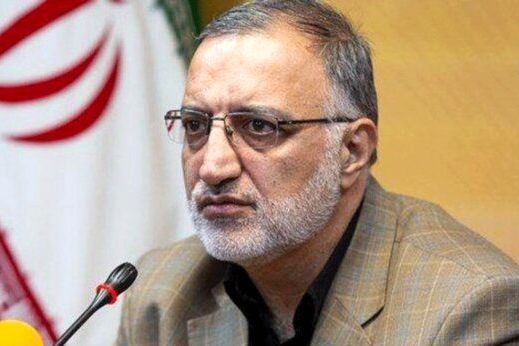
Tehran’s mayor, hardliner politician Alireza Zakani, has called on his counterparts in Muslim countries “not to allow the issue of Palestine to be forgotten.”

Tehran’s mayor, hardliner politician Alireza Zakani, has called on his counterparts in Muslim countries “not to allow the issue of Palestine to be forgotten.”
Zakani, who was a presidential candidate in 2021 and received the post after losing the election, wrote to mayors of cities in Islamic countries, stating that Israel’s attack on Gaza was “among the biggest crimes of the past century.”
Reiterating the Islamic Republic’s pro-Hamas rhetoric, Zakani blamed the United States and “a handful of European countries” for standing by Israel and insisted that the Palestinian cause is part of the anti-imperialist campaign. He told his counterparts that Muslim mayors have a serious duty and responsibility to defend Gaza.
The Iranian regime immediately congratulated Hamas on October 7 as the militant group launched its terror attack on Israel. The government ordered street celebrations, but the Iranian public has shunned pro-Hamas gatherings, unlike large rallies in Western capitals.
Many Iranians are opposed to the government’s policy of spending billions of dollars to create and support militant groups throughout the region. They believe that the regime’s anti-West and anti-Israel foreign policy has impoverished the country.
Zakani asked his counterparts in the Muslim world to help pressure their government to cut all ties with Israel and apply sanctions. Iran’s president Ebrahim Raisi made the same proposals in a summit of Muslim leaders in Saudi Arabia on Saturday.
He also asked them to support “popular gatherings” in support of Palestinians in their cities, a policy the Iranian regime applies regularly, by distributing free food to the crowds to encourage a larger turnout.

Israel defense minister Yoav Gallant threatened a heavy cost for the Lebanese if Hezbollah “crossed the red line” as the leader of the group was delivering a speech.
The Israeli army and Iran-backed Hezbollah have clashed almost daily since Israel started its war on Gaza in retaliation for the Hamas attack on 7 October.
Gallant held a press conference Saturday afternoon local time, almost the same time as Hezbollah leader Hassan Nasrallah delivered his televised speech.
“Hezbollah is close to making a grave mistake and the ones who will pay the price are first of all the citizens of Lebanon,” Gallant said. “What we do in Gaza we know how to do in Beirut.”
Both sides issued statements and videos Saturday, detailing their operations and claiming victories –in what many say increasingly looks like a prologue to an all-out war.Neither side has made a gesture that would alleviate that fear.
In his speech Saturday, Nasrallah boasted about Hezbollah’s capabilities, claiming that his armed men had used new types of weapons and struck new targets in Israel.
"This front will remain active," he stated.
Reporters who have visited border areas of Lebanon and Israel say the reality on the ground is more serious than many think and that “there is a sense of impending conflict.
Hezbollah is much stronger than Hamas. It is by far the strongest group in what the regime in Iran calls the Axis of Resistance, including militias in Iraq, Syria and Yemen –besides Hezbollah and Hamas.
The Islamic Republic openly (and materially) supports these groups but maintains that they all act independently, avoiding direct responsibility for their military operations against Israel and American interests in the region. The Iranian regime immediately celebrated Hamas’ October 7 terror attack on Israel.
Coinciding with Nasrallah’s speech, Iran’s President Ebrahim Raisi met with Saudi crown prince Mohammad bin Salman on the sidelines of the summit of the Organisation of Islamic Cooperation (OIC) in Riyadh.
There, Raisi called on Islamic governments to designate Israel’s military a “terrorist organization” and asked those Muslim countries who have diplomatic ties with Tel Aviv to sever those ties.
“There is no other way but to resist Israel, we kiss the hands of Hamas for its resistance against Israel," Raisi said in his address to the summit.
Some other member states, including UAE, Bahrain and Saudi Arabia, reportedly rejected Iran’s suggestions, including a ban on the US use of their airspace to deliver weapons to Israel.
Still, the event turned out to be a rare show of unity from OIC members, who called Israel’s bombardment of Gaza “barbaric” and demanded that the UN security council adopt “a binding resolution” to halt Israel’s “aggression”.
Hosting the summit, Saudi crown prince Mohammad bin Salman condemned Israel’s “continuing aggression, occupation and forced displacement of the people of Gaza and said Israel bears responsibility for the “crimes committed against the Palestinian people.”
“Israel’s flagrant violations of international laws must be stopped,” he said.
More than 11,000 Palestinians have been killed in Israeli airstrikes since 8 October, a significant majority of them women and children, according to the United Nations.
Hundreds of thousands of people marched in various countries Saturday, protesting Israel’s military operation and demanding a humanitarian ceasefire.
Israeli Prime Minister Benjamin Netanyahu, however,insists on carrying on. “The battle to crush Hamas” would continue with “full force”, he said Saturday.
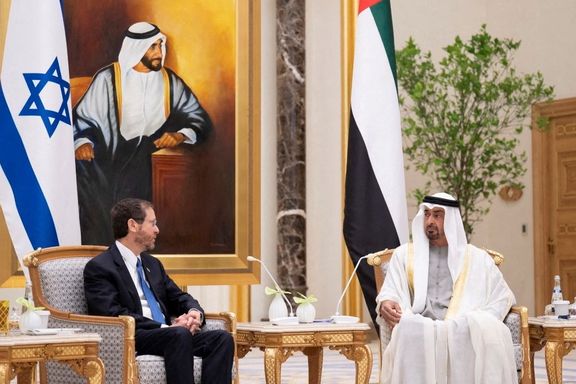
The United Arab Emirates plans to maintain diplomatic ties with Israel despite international outcry over the mounting toll of the war in Gaza.
According to Reuters, the UAE hopes to have some moderating influence over the Israeli campaign while safeguarding its own interests.
The UAE became the most prominent Arab state to establish diplomatic ties with Israel in 30 years under the US-brokered Abraham Accords in 2020. That paved the way for other Arab states to forge their own ties with Israel by breaking a taboo on normalizing relations without the creation of a Palestinian state.
The mounting death toll from Israel's invasion of the Gaza Strip – launched in retaliation for cross-border attacks on October 7 by the Hamas militant group that governs the enclave – have stirred outrage in Arab capitals.
UAE President Sheikh Mohamed bin Zayed Al Nahyan spoke last month with Israeli Prime Minister Benjamin Netanyahu. UAE officials have publicly condemned Israel's actions and repeatedly called for an end to the violence.
As well as speaking to Israel, the UAE has worked to moderate public positions taken by Arab states so that once the war ends there is the possibility of a return to a broad dialogue.
Despite closer economic and security ties with Israel forged over the past three years, Abu Dhabi has had little apparent success in reining in the Gaza offensive.
Israel has rejected international calls for an immediate ceasefire. Netanyahu has pledged to destroy Hamas, which is classified as a terrorist organization by the United States and the European Union.
While criticizing Israel's conduct of the war, Abu Dhabi has also condemned Hamas for its attack. The UAE sees the Palestinian militant group and other Islamists as a threat to the stability of the Middle East and beyond.
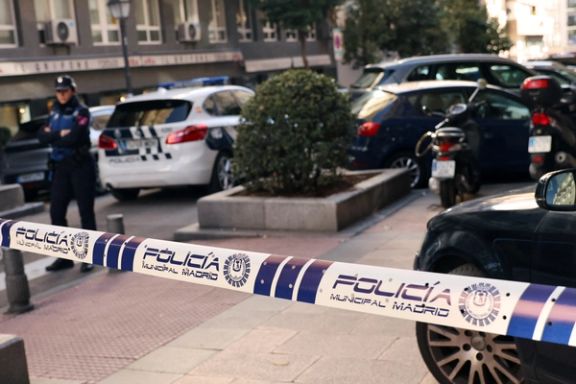
While Spain is in shock after a politician was shot in the face, Spanish media is whispering about Iran’s possible role in the assassination attempt.
The former head of Spain's center-right People's Party in the Catalonia region, Alejo Vidal-Quadras, was shot on his doorstep in the wealthy Salamanca area of central Madrid at about 1.30 p.m. Thursday and taken to hospital.
The founder of the Vox party miraculously survived as a bullet passed through his jaw. Police were hunting a gunman and an accomplice who drew up near Vidal-Quadras on a black Yamaha motorcycle, shot him, then drove off. A torched motorcycle police believe was used in the attack was later found. According to local media, police believe the shooter was a professional, paid to kill the politician.
Immediately after the incident, Spanish media reported speculations of Iran’s possible involvement in the attack with claims that Vidal-Quadras told doctors and relatives post-surgery that he believes Iran is behind the hit, which was then relayed to Spanish authorities. If true, it would be an unprecedented attack by the Islamic Republic on Spanish soil.
In October 2022, the Iranian Ministry of Foreign Affairs imposed sanctions on a long list of critics for their solidarity with the popular uprising sparked by the death in custody of a young woman that came to be known as the Women, Life, Freedom movement.
Vidal-Quadras, who served as European Parliament vice-president between 2009 and 2014, was accused by Tehran of "supporting terrorism and terrorist groups and spreading violence and hatred" for his strong condemnations of the crackdown on protests by the country’s ruling circle as well as his contacts with exiled opposition group Mojahedin-e-Khalq (MEK). The Spaniard was among eight European entities and 12 people who were blacklisted by Tehran in retaliation to the European Union sanctions imposed on Iran.
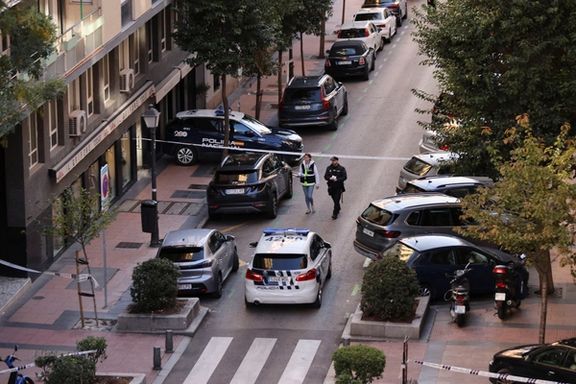
Shahin Gobadi, a member of the Foreign Affairs Committee of the National Council of Resistance of Iran, the political wing of the MEK, said in a statement on Thursday that Vidal-Quadras has been a staunch supporter of the Iranian opposition movement and fight for human rights in Iran over the past 25 years.
Spain’s El Mundo daily highlighted a statement by the Iranian Embassy in Spain released within hours after the assassination attempt, condemning MEK for acts of terrorism against over “17,000 Iranian innocent victims.”
"The Iranian nation has been and is one of the largest and oldest victims of terrorism," reads the brief text, published on the social platform X (formerly twitter). The Embassy emphasized that "the fight against terrorism and bringing the perpetrators of terrorist acts to justice are defined as one of the principles and priorities of the foreign policy of the Islamic Republic of Iran, which firmly condemns any type of terrorist operation.”
El Mundo quoted MEK leader Maryam Rajavi as saying that it is “clear” that “the main suspect is the religious fascism that has power in Iran.”
Spanish online newspaper El Español also wrote of “the shadow of the ayatollahs” in the assassination attempt, citing police sources as saying that Vidal-Quadras himself has indicated that in his work as a lawyer he handled cases related to the opposition to the Islamic Republic regime.
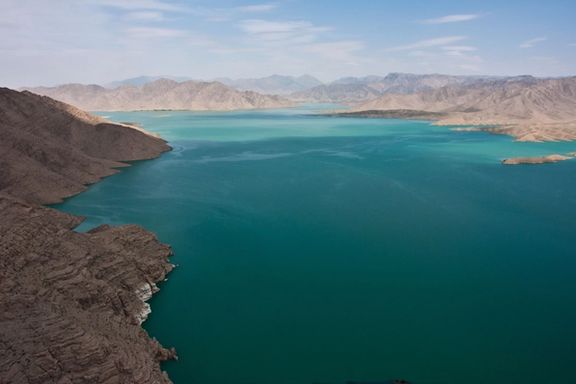
An Iranian official has claimed that Tehran reached an oral agreement with the Taliban concerning its water share of the Hirmand River, denied for several months.
The river, known as Helmand in Afghanistan, plays a crucial role in sustaining both Afghanistan and Iran, serving as a vital source for agriculture and drinking water. Despite its significance, the river has been a persistent cause of tension between the two neighboring countries.
Ali Mohammad Tahmasbi, an advisor to the Iranian Environmental Protection Organization, stated that Abdul Ghani Baradar, the Afghan First Deputy Prime Minister for Economic Affairs, assured that as soon as conditions permit, steps would be taken to address the Helmand River issue.
Baradar led an Afghan delegation that visited Tehran last week, engaging in discussions with officials of the Islamic Republic, including Ali Salajegheh, the head of the Iranian Environmental Protection Organization.
According to reports from the Iranian Labor News Agency (ILNA), Tahmasbi emphasized the expectation for the Taliban "not to neglect the release of the Helmand River water share based on principles of good neighborliness and strengthening regional relations."
Iran has accused Afghanistan of obstructing the river's water flow through the construction of dams, an allegation vehemently denied by Afghan authorities. Iranian government officials and environmentalists argue that dam construction on the river exacerbates issues in Iran's eastern regions, particularly in the water-scarce Sistan-Baluchestan province.
The matter of Iran obtaining its rightful share of the water has been a long-standing dispute between Iran and the Afghanistan. However, the disagreements have intensified with the resurgence of the Taliban in Afghanistan, leading to recent disputes between the authorities of the two neighboring nations.
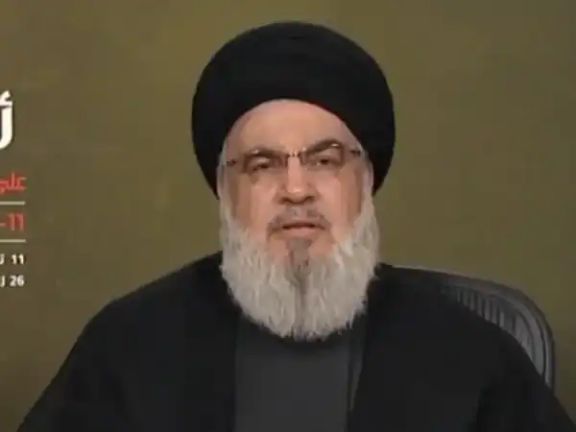
Hezbollah leader Hassan Nasrallah has commended the Iranian regime’s support for his organization and the so-called "axis of resistance".
"Resistance forces have been able to continue to fight due to the Islamic Republic's support," Nasrallah said in his second speech since Hamas launched a terror attack against Israel that resulted in an Israeli invasion of the Gaza Strip in pursuit of militants.
The "Resistance Front" refers to the alliance of armed militant groups sponsored by Iran, including Hezbollah, Hamas, the Palestinian Islamic Jihad, Houthis in Yemen, and Iraqi Shiite militias.
"The Islamic Republic of Iran continues to provide military and financial support to Palestinian groups and the resistance front, and has never concealed this support," Nasrallah said.
Established in 1982 by the Iranian Revolutionary Guards, Hezbollah is the cornerstone of a Tehran-backed alliance hostile to Israel and the United States.
Continuing on with the same rhetoric of his first speech, Nasrallah praised Hamas and denounced Israel without calling for a full-blown war by his group, however, he did point toward "an upgrade" in Hezbollah operations.
Meanwhile, in Riyadh, Saudi Crown Prince Mohammed bin Salman met with Iranian President Ebrahim Raisi on Saturday. The Iranian official is in Riyadh for the joint Arab League- Organisation of Islamic Co-operation summit to discuss the situation in Gaza. Moslem leaders attending the summit called for an immediate ceasefire in Gaza.